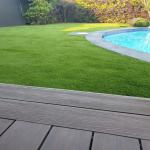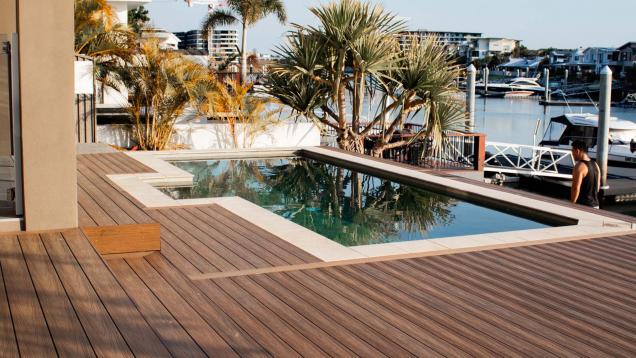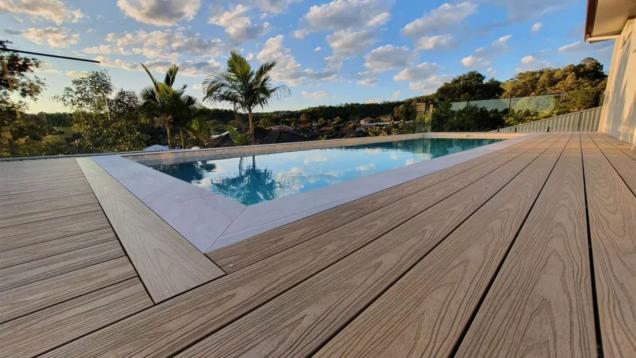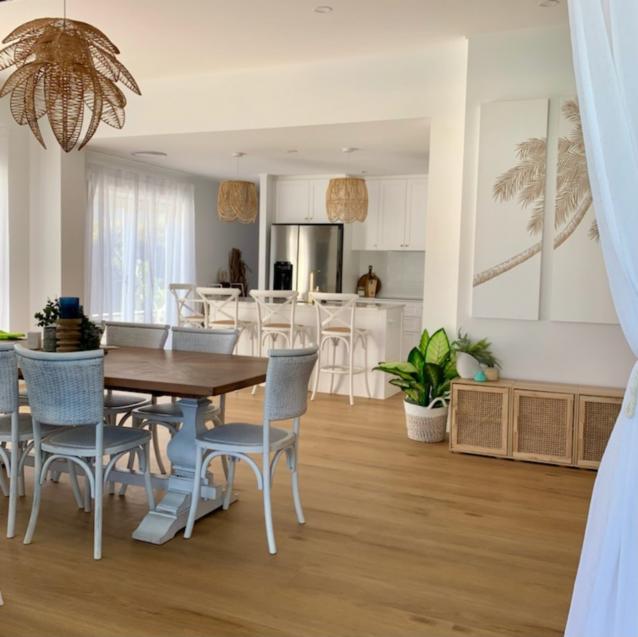
Is Artificial Grass at Risk of Catching Fire?
By Ezy Decking|January 22, 2024
Are you considering sprucing up your outdoor space with artificial grass but wondering about its safety aspects, particularly its flammability? You're not alone. As a passionate DIY enthusiast or a professional in the field, it's crucial to delve into the nitty-gritty of what you're working with – and that’s exactly what we’re going to explore today.
Here at Ezy Decking, with over 25 years in the DIY and timber industry, we understand the importance of balancing aesthetic appeal with safety. So, we’ll walk you through everything you need to know. This isn’t just about making your outdoor space look fantastic; it’s about ensuring it’s a safe haven for you, your family, and your guests.
Artificial grass has become a popular choice for its low maintenance and evergreen charm. But as with any home improvement project, it's vital to consider all safety angles – and fire safety tops that list. Is artificial grass flammable? What safety measures should you take? How do you choose the right product? These are all questions that deserve thorough answers, and we’re here to provide them.
What is Artificial Grass?
You've probably seen artificial grass around more often these days, haven't you? Whether it's in a neighbour's yard, a bustling commercial space, or even a public park, artificial grass is becoming a go-to choice for many. But what exactly is it?
Artificial grass, often known as synthetic turf, is a surface made from synthetic fibres designed to mimic the look and feel of natural grass. At its core, it's crafted from materials like polyethylene, polypropylene, or nylon. These synthetic fibres are then attached to a backing material that keeps everything in place. It's a clever design that not only looks like the real deal but also withstands wear and tear much better than its natural counterpart.
Common Uses in Residential and Commercial Settings
Why Choose Artificial Grass?
The Flammability of Artificial Grass
Let's get straight to the heart of the matter: Is artificial grass flammable?
To understand this, you need to know what it's made of. Artificial grass typically consists of synthetic materials like polyethylene, polypropylene, or nylon. These materials are chosen for their durability and resemblance to natural grass, but how do they react to fire?
Now, here's where it gets interesting. These synthetic fibres are not naturally fireproof. However, they don't catch fire easily. When exposed to flame, artificial grass doesn't ignite readily like dry natural grass would. Instead, it melts. This melting can create a safety hazard, but it doesn't spread flames in the same way traditional grass does. Owners of traditonal lawn are required to keep their lawns mown on a regular basis by a Gold Coast lawn mowing expert to limit the threat of grass catching on fire can present.
Understanding Fire Ratings
To gauge the fire safety of artificial grass, we turn to fire ratings. These ratings are crucial because they tell you how the material reacts under fire conditions. Here’s what they generally mean for artificial grass:
Factors Affecting Flammability
You might be wondering, "What can affect the flammability of my artificial grass?" Well, several factors come into play:
Safety Measures and Standards
Fire Safety Standards for Artificial Grass
You want your lush, green lawn to be a haven, not a hazard, right? Understanding these standards is key to making an informed choice.
Identifying Standards on Your Artificial Grass
Tips to Reduce Fire Risks
Regular Maintenance for Fire Prevention
Choosing the Right Artificial Grass for Safety
When it comes to enhancing your outdoor space with artificial grass, safety should be at the forefront of your decision-making process. Picking the right type is not just about aesthetics; it's about ensuring a safe environment for you and your loved ones. Let’s break down what you should look for when selecting artificial grass, focusing on safety without compromising on quality.
Factors to Consider
Fire Rating
Look for artificial grass with a high fire rating. Products are often rated according to their fire-resistant properties. The higher the rating, the less likely the grass is to ignite and spread fire. Always check the product specifications for this information.
Material Quality
The quality of the materials used in artificial grass plays a crucial role in its safety. Higher-quality materials tend to be more fire-resistant. Look for options that use advanced, non-flammable materials. Remember, the initial investment in quality can save you from potential hazards in the long run.
Certifications and Standards
Ensure that the artificial grass you’re considering meets the necessary safety standards and certifications. Products that adhere to national and international safety standards are more reliable. These certifications are a testament to the product’s safety and quality.
Manufacturer Reputation
Opt for products from reputable manufacturers. A well-established manufacturer is likely to offer artificial grass that has undergone rigorous testing for safety and durability. Check for reviews, testimonials, and the company’s history in the market.
Warranty and Support:
A good warranty can be indicative of the quality of the product. Manufacturers confident in their artificial grass often provide substantial warranties. Also, consider the level of customer support offered. Post-purchase support can be invaluable in addressing any safety concerns you might have down the line.
Quality vs. Price
It's tempting to go for the most cost-effective option, especially in DIY projects. However, when it comes to safety, prioritising quality over price is essential. Cheaper alternatives might not provide the same level of fire resistance or durability, potentially leading to higher costs in the long run due to maintenance or replacement needs.
For all your Brisbane artificial turf and Brisbane composite deck needs, consult the team at Ezy Decking.
Here at Ezy Decking, with over 25 years in the DIY and timber industry, we understand the importance of balancing aesthetic appeal with safety. So, we’ll walk you through everything you need to know. This isn’t just about making your outdoor space look fantastic; it’s about ensuring it’s a safe haven for you, your family, and your guests.
Artificial grass has become a popular choice for its low maintenance and evergreen charm. But as with any home improvement project, it's vital to consider all safety angles – and fire safety tops that list. Is artificial grass flammable? What safety measures should you take? How do you choose the right product? These are all questions that deserve thorough answers, and we’re here to provide them.
What is Artificial Grass?
You've probably seen artificial grass around more often these days, haven't you? Whether it's in a neighbour's yard, a bustling commercial space, or even a public park, artificial grass is becoming a go-to choice for many. But what exactly is it?
Artificial grass, often known as synthetic turf, is a surface made from synthetic fibres designed to mimic the look and feel of natural grass. At its core, it's crafted from materials like polyethylene, polypropylene, or nylon. These synthetic fibres are then attached to a backing material that keeps everything in place. It's a clever design that not only looks like the real deal but also withstands wear and tear much better than its natural counterpart.
Common Uses in Residential and Commercial Settings
- Residential: In homes, artificial grass is often used in backyards, especially in areas where growing natural grass is a challenge due to climate or water restrictions.
- Commercial: For commercial spaces, think of sports fields, office building courtyards, or even rooftop gardens in urban settings. It's also a hit in public areas like parks and playgrounds.
Why Choose Artificial Grass?
- Low Maintenance: Imagine having a lush green lawn without the constant mowing, watering, or fertilizing. Sounds great, right? That's the beauty of artificial grass. It's virtually maintenance-free.
- Year-Round Green Appearance: No more worrying about brown patches or seasonal changes affecting your lawn’s look. With artificial grass, your yard stays green and vibrant all year long.
- Environmental Considerations: Here’s something you might not know – artificial grass is quite the friend to the environment. It significantly reduces water usage, which is a boon, especially in areas prone to drought. No need for harmful pesticides or fertilizers either, making it a safer choice for both you and the planet.
The Flammability of Artificial Grass
Let's get straight to the heart of the matter: Is artificial grass flammable?
To understand this, you need to know what it's made of. Artificial grass typically consists of synthetic materials like polyethylene, polypropylene, or nylon. These materials are chosen for their durability and resemblance to natural grass, but how do they react to fire?
Now, here's where it gets interesting. These synthetic fibres are not naturally fireproof. However, they don't catch fire easily. When exposed to flame, artificial grass doesn't ignite readily like dry natural grass would. Instead, it melts. This melting can create a safety hazard, but it doesn't spread flames in the same way traditional grass does. Owners of traditonal lawn are required to keep their lawns mown on a regular basis by a Gold Coast lawn mowing expert to limit the threat of grass catching on fire can present.
Understanding Fire Ratings
To gauge the fire safety of artificial grass, we turn to fire ratings. These ratings are crucial because they tell you how the material reacts under fire conditions. Here’s what they generally mean for artificial grass:
- Class A Fire Rating: This is the highest rating, indicating that the grass has a high resistance to fire. It's the kind you want in your yard for the best safety.
- Class B and C Ratings: These are lower ratings, indicating moderate resistance. While not as optimal as Class A, they still offer some level of protection.
- No Rating: If there’s no fire rating, it’s a red flag. It's wise to steer clear of these for safety reasons.
Factors Affecting Flammability
You might be wondering, "What can affect the flammability of my artificial grass?" Well, several factors come into play:
- Installation Quality: Poorly installed artificial grass can have gaps and loose ends that might increase fire risks. Ensuring a tight, proper installation is key.
- Maintenance: Regular cleaning to remove flammable debris like dry leaves and twigs is essential. Also, be mindful of reflective surfaces nearby – they can magnify sunlight onto the grass, increasing fire risk.
- Environmental Factors: The area's climate and weather conditions can also influence flammability. In hot, dry areas, the risk might be higher.
Safety Measures and Standards
Fire Safety Standards for Artificial Grass
You want your lush, green lawn to be a haven, not a hazard, right? Understanding these standards is key to making an informed choice.
- What They Are: These standards determine how resistant artificial grass is to fire. They're set by safety organizations and govern things like ignition resistance and how quickly a fire can spread.
- Certifications to Look For: Keep an eye out for certifications like ASTM E648 or EN 13501-1. These are common benchmarks that indicate a product has undergone rigorous fire safety testing.
Identifying Standards on Your Artificial Grass
- Check the Label: This is your first stop. Look for fire safety ratings or certifications mentioned directly on the product label.
- Ask the Manufacturer: If it's not clear, don't hesitate to ask the supplier or manufacturer directly. A reputable company should be transparent about their product's safety features.
Tips to Reduce Fire Risks
- Proper Installation: Make sure it's installed correctly. Poor installation can increase fire risks.
- Distance from Open Flames: This might seem like a no-brainer, but keep barbecues, fire pits, and other open flames away from your artificial turf.
- Avoid Smoking: Discourage smoking near the artificial grass. A single ember can cause trouble.
Regular Maintenance for Fire Prevention
- Keep It Clean: Remove debris like leaves and twigs regularly. These can be potential fire hazards.
- Regular Checks: Periodically inspect your artificial grass for signs of damage or wear that could impact its fire resistance.
Choosing the Right Artificial Grass for Safety
When it comes to enhancing your outdoor space with artificial grass, safety should be at the forefront of your decision-making process. Picking the right type is not just about aesthetics; it's about ensuring a safe environment for you and your loved ones. Let’s break down what you should look for when selecting artificial grass, focusing on safety without compromising on quality.
Factors to Consider
Fire Rating
Look for artificial grass with a high fire rating. Products are often rated according to their fire-resistant properties. The higher the rating, the less likely the grass is to ignite and spread fire. Always check the product specifications for this information.
Material Quality
The quality of the materials used in artificial grass plays a crucial role in its safety. Higher-quality materials tend to be more fire-resistant. Look for options that use advanced, non-flammable materials. Remember, the initial investment in quality can save you from potential hazards in the long run.
Certifications and Standards
Ensure that the artificial grass you’re considering meets the necessary safety standards and certifications. Products that adhere to national and international safety standards are more reliable. These certifications are a testament to the product’s safety and quality.
Manufacturer Reputation
Opt for products from reputable manufacturers. A well-established manufacturer is likely to offer artificial grass that has undergone rigorous testing for safety and durability. Check for reviews, testimonials, and the company’s history in the market.
Warranty and Support:
A good warranty can be indicative of the quality of the product. Manufacturers confident in their artificial grass often provide substantial warranties. Also, consider the level of customer support offered. Post-purchase support can be invaluable in addressing any safety concerns you might have down the line.
Quality vs. Price
It's tempting to go for the most cost-effective option, especially in DIY projects. However, when it comes to safety, prioritising quality over price is essential. Cheaper alternatives might not provide the same level of fire resistance or durability, potentially leading to higher costs in the long run due to maintenance or replacement needs.
For all your Brisbane artificial turf and Brisbane composite deck needs, consult the team at Ezy Decking.



